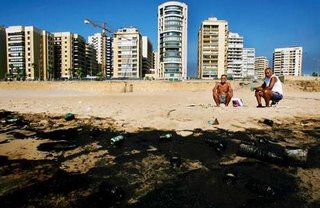
The spill was caused by the bombing of oil storage units at the Jiyyeh power plant, 30 kilometers (19 miles) south of Beirut, in the early days of Israel's campaign against the Hezbollah between July 13 and 15. About 10,000 tons of oil has escaped and up to 35,000 tons may finally seep out, the United Nations' International Maritime Organization said.
Israel has bombed airports, ports, bridges, roads and other facilities in Lebanon, inflicting losses estimated at more than $4 billion, according to the Lebanese government.
The oil spill has already contaminated about 10 kilometers of coastline in Syria, according to the UN Environment Program. The slick had polluted two-thirds of Lebanon's 220-kilometer coastline as of a week ago, Sarraf said.
Israeli jets, which attacked the power plant twice, deterred firemen from putting out the fire at the storage units, which continued for 10 days, he said. The Israel navy also prohibited Lebanese and foreign officials from surveying the damage of the spill from Lebanon's territorial waters, he said.
Sea Blockade
The Israeli navy has maintained three weeks of sea blockade, stopping ships from entering or leaving Lebanese ports without its prior approval.
Only Kuwait has heeded the minister's pleas and sent Lebanon chemicals to clean up some of the oil spill, which has grown into a 3,000-square kilometer area because it absorbed water, Sarraf said.